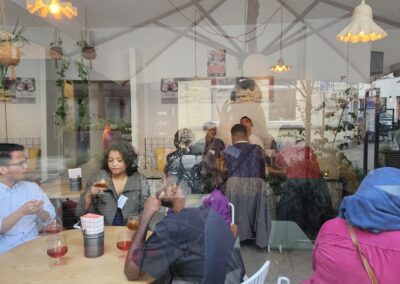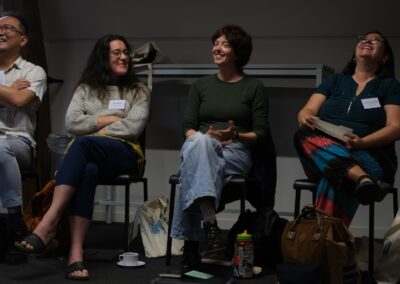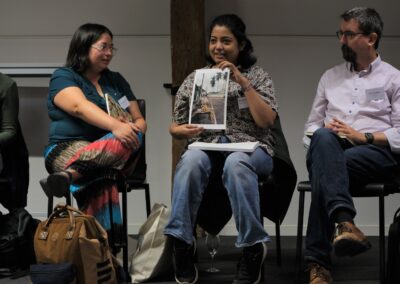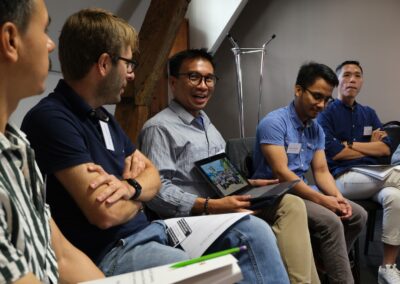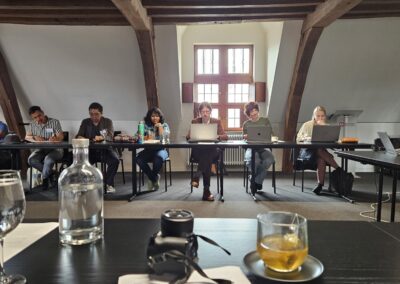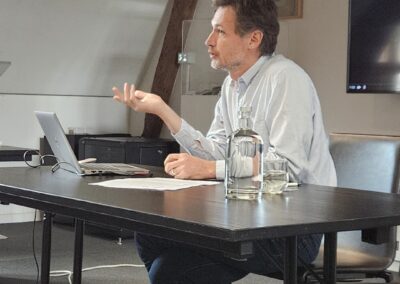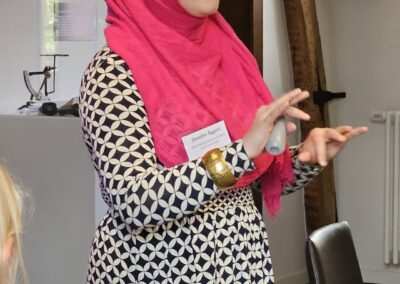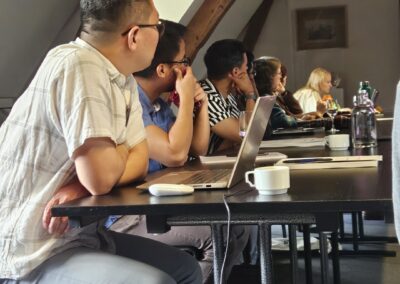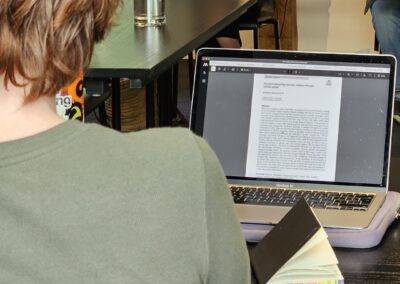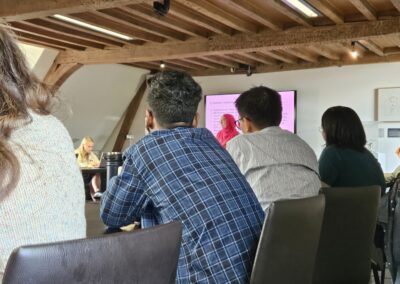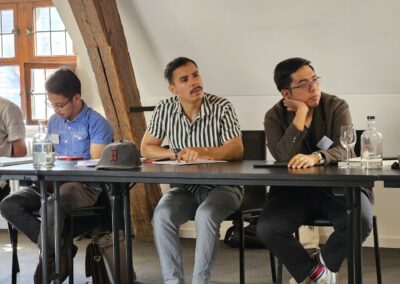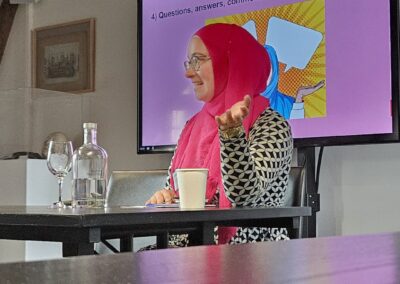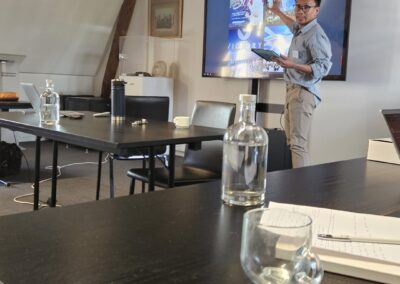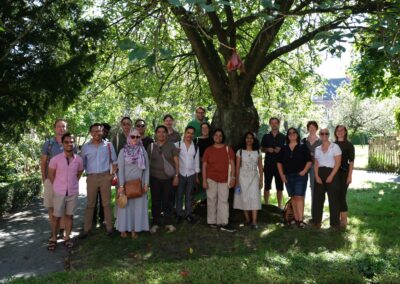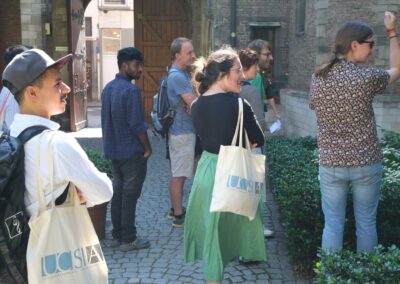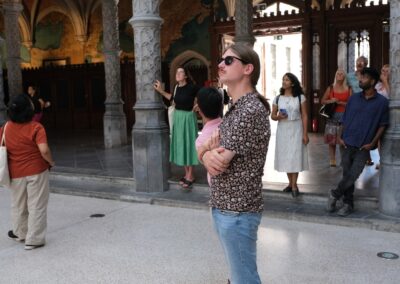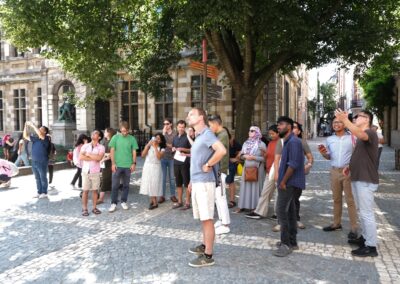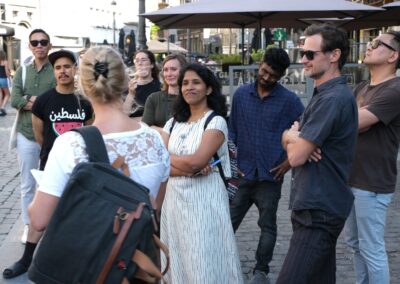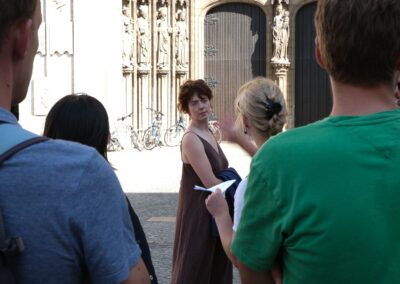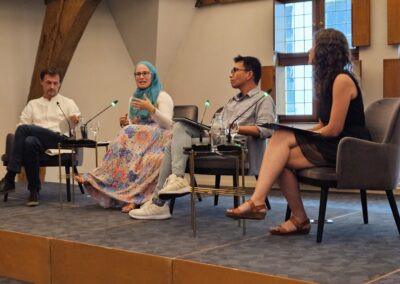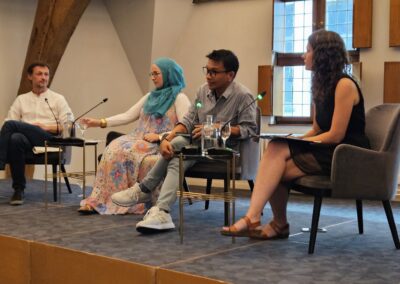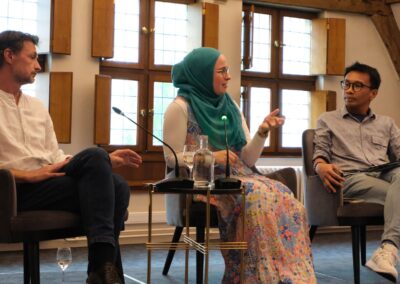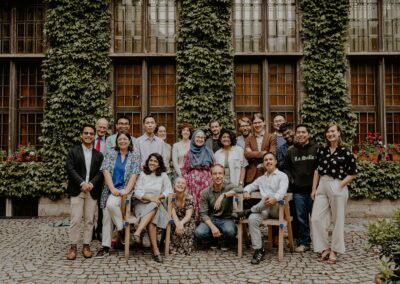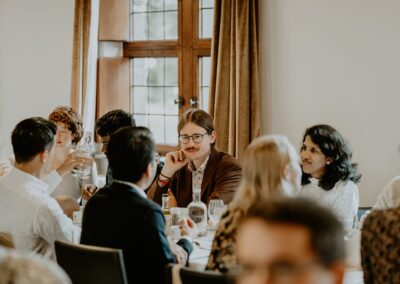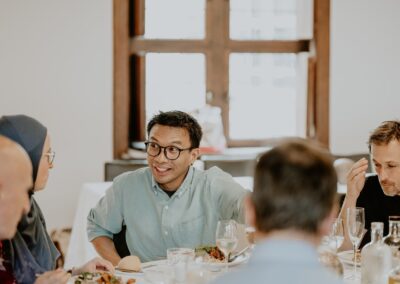UCSIA Summer School 2024
25 – 30 August 2024
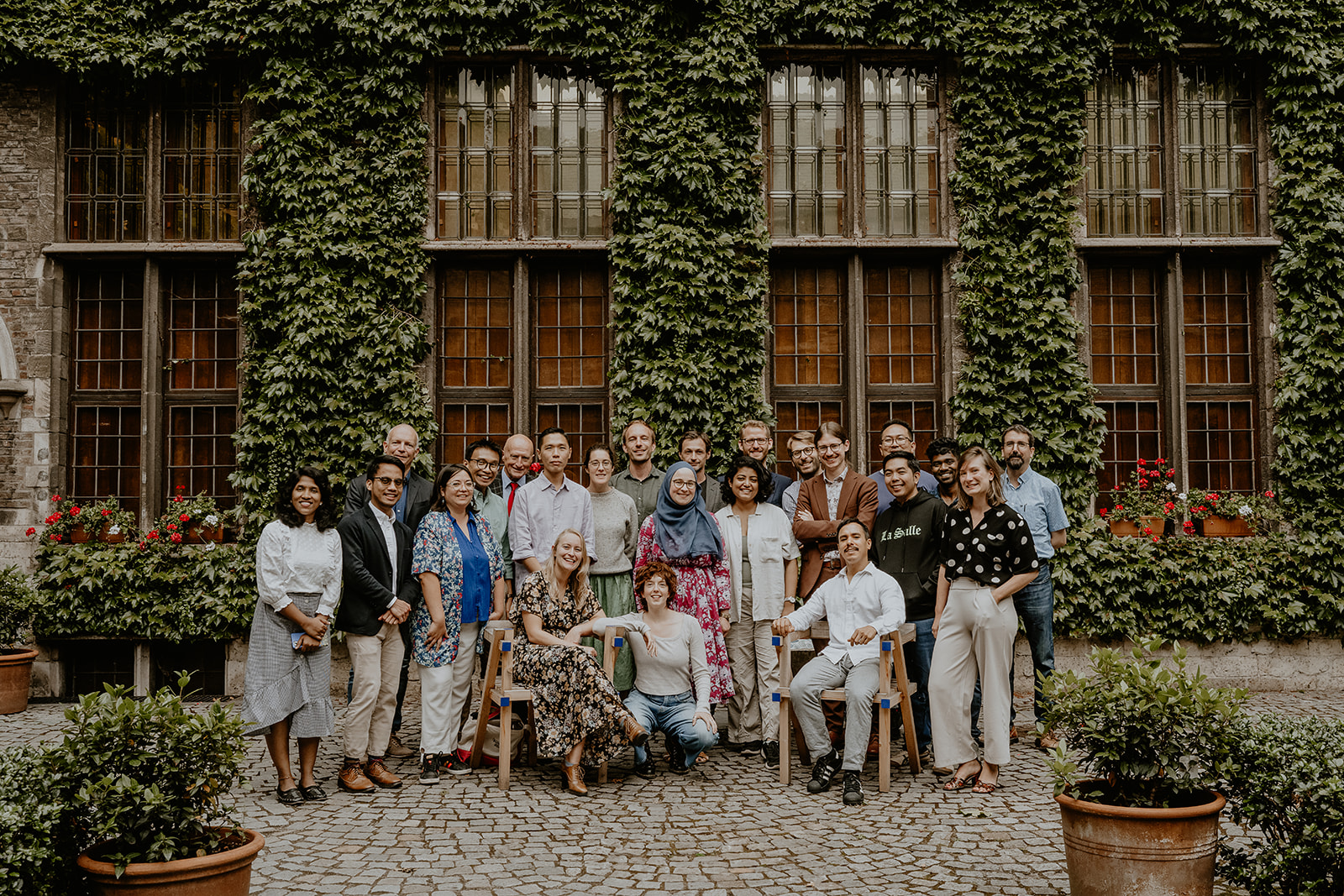
Second row: Walter Van Herck, Jayeel Cornelio, Luc Braeckmans, Thao Nghiem, Iona Ramsay, Xavier Casanovas Combalia, Vlad Naumescu, John Arblaster, Valerio Aversano, Sunkyo Park, KJ Ananthan, Erik De Bom
First row: Bincy Nirichan, Jethro Calacday, Ely Orrego Torres, Kaat Somers, Jen Logan, Jennifer Eggert, Namrata Hazarika, Jens Van Rompaey, Edward Ablang, Darren Dumaop, Gilke Gunst.
© Sigrid Meulemans
theme
God on Our Side?
Questioning Theological Narratives of Nationalism, Populism and Conservatism
From 25 until 30 August 2024, 14 promising PhD and postdoctoral researchers gathered at the University of Antwerp for the UCSIA Summer School on religion, culture and society.
This year’s cohort included scholars from the fields of history, theology, philosophy, social anthropology, literature and political science, with a research interest in the entanglement of theological narratives with discourses of nationalism, populism and conservatism.
Throughout the week, they presented and discussed their own research extensively with their peers and tutors Jayeel Cornelio (Professor of Development Studies, Ateneo de Manila University), Jennifer Eggert (Senior Research & Programme Associate, Joint Learning Initiative on Faith & Local Communities) and Vlad Naumescu (Associate Professor of Social Anthropology, Central European University).
Furthermore, during the plenary lectures, the faculty members provided insights into the different ways of studying theopolitics by drawing on their own research. For example, discussions covered topics such as the secular-religious divide and the politics of ‘schisms’, the concept of ‘theological nationalism’ and the analytical lens of ‘gender’.
Lectures by Jayeel Cornelio:
Theology, Nationalism and Theological Nationalism
This session introduces the concept of ‘theological nationalism’. It refers to the discursive act of asserting the religious identity of a nation-state by drawing on theological justifications. It is, in a manner of speaking, a theology that claims the nation. The discursive act has two aspects. The first is the content of the religious claim itself over the identity of the nation-state: What exactly is being claimed? The second is the theological basis of the claim: What are the religious worldviews, beliefs, or convictions that inform the claim to the religious identity of a nation-state?
These two questions mirror the emerging theological reflections troubled by supremacist Christian nationalism around the world. As the theologian Dorian Llywelyn rightly observes, “many nations” have claimed “chosen people status by a selective arrogation of texts from the Hebrew Bible.” This lecture’s emphasis on theological discourse recognizes that inasmuch as religious nationalism takes shape in varying degrees around the world, its manifestations all rely on a religious vision and basis. Thus, the theological content and its underpinnings demand a closer look from a social scientific perspective. The first part of the lecture will cover the wider scholarship about religion and nationalism: religious nationalism and Christian nationalism. I will then explain why the theological aspect needs to be emphasized and illustrate my points using empirical data from my research on religion and politics in the Philippines.
The Religious Resistance to Legalizing Divorce in the Philippines
The Philippines is one of the two remaining countries without a divorce law (except for a special provision for Muslim Filipinos). While the Philippines allowed divorce during the American occupation in the early 20th century, its legislators, with the backing of the Catholic Church, repealed it in 1950. Many efforts have since been made to resurrect divorce in the country, but the religious resistance endures. What exactly is this resistance about?
Building on my first lecture about religious nationalism, this session will attempt to provide an answer: The discourse treats divorce as a moral evil in Philippine society. I will demonstrate this in three ways. For religious entities, marital dissolution is (a) sinful and (b) anti-family. Early scholars of divorce in the country have pointed these out. A third one is emerging, and it is that divorce, for being a Western import, is (c) anti-Filipino. Taken together, the religious rhetoric treats divorce as a moral evil that threatens Philippine society. In this session, I will also show that the resistance no longer comes from the Catholic Church alone. Emerging Christian entities have participated in the resistance. As a way of engaging the dominant theological discourse, the last part of the talk will turn to a critical assessment of divorce as a socially constructed moral evil.
Lectures by Jennifer Philippa Eggert:
Gender in the Study of Religion, Society and Politics
What is gender? Studying gender is often mistaken for a focus on women’s issues. Yet, the study of gender is significantly broader than only a focus on topics immediately relevant to women’s lives. This lecture will examine different approaches to the study of gender in the humanities and social sciences, with a particular focus on its relevance to religion, society and politics in general, and theological narratives related to nationalist, populist and conservative movements more specifically. It explores how gender has been approached in research, practice, policy and activism; introduces key concepts and terms; and discusses key issues and recent trends in the study of gender, religion, society and politics.
Gender and Religion in Nationalist, Populist and Conservative Movements in Europe, the Middle East and Beyond
Gender and religion play key roles in many nationalist, populist and conservative movements worldwide. What are considered appropriate gender roles in nationalist, populist and conservative organisations? Which expressions of sexuality are considered legitimate? How are gender and sexuality governed in these movements, and how do gender and religion shape such collectives in return? This lecture takes a comparative approach to the topic with a focus on Europe and the Middle East in a global perspective. It draws on a range of case studies from religious and secular nationalist, populist and conservative movements in the 20th and 21st century, to explore how violent and non-violent organisations of different geographical and faith backgrounds have approached gender and religion.
Lectures by Vlad Naumescu:
Theo-politics (part 1): interrogating the ‘Political’
This lecture explores the intricate relationship between theology and politics from the ‘political’ side, questioning its secular underpinnings and normative concepts such as secularism and postsecularity. Anthropological insights into what constitutes the ‘political’ expand beyond the modern notion of ‘politics’ as separate from religion, leading to a necessary recognition of the historical entanglement of political and religious orders and their enduring presence in ‘theologico-political’ formations. This calls for a conceptual reconsideration and a better understanding of how such historical formations continue to shape social-political mobilizations in the present day.
Theo-politics (part 2): Religious Contestation in Secular Courts
The second lecture builds on the first, approaching ‘theo-politics’ from its theological side including anthropology’s engagement with theology. It investigates the transmutation of religious rites into secular rights within the Christian world, drawing on ethnographic research with Eastern and Oriental Orthodox communities in postsocialist and postcolonial contexts. These cases show what occurs when issues of orthodoxy, canonicity, and ecclesiology are turned to secular courts and how the historical entanglement of law and religion is reshaping Orthodox Christianity today.
Jethro Calacday Publishes in Diplomatic History
We’re delighted to share exciting publication news from Jethro Calacday, one of our 2024 Summer...
Edward Ablang presents at two major conferences
We are proud to share recent updates from Edward Ablang, a participant in last year's Summer...
Vlad Naumescu returns to the UCSIA Summer School 2025
We are happy to announce the first mentor of the 2025 UCSIA Summer School: Meet Vlad Naumescu! Dr....
Dr. Xavier Casanovas Combalia publishes paper in renowned Spanish philosophy journal ‘Pensamiento’
We are delighted to share the academic success of Dr. Xavier Casanovas Combalia, an alumnus of the...
Jennifer P. Eggert and Behar Sardiu explore the role and experiences of Muslim pracademics
This year's UCSIA Summer School lecturer Jennifer P. Eggert joined forces with Behar Sardiu for...
Ely Orrego Torres publishes article on ecofeminist political theology in Latin America
This year's UCSIA Summer School student Ely Orrego Torres and Diego Rossello published a paper in...
Replay the panel debate on religion and politics
All over the world, we see this phenomenon of populist leaders who make use of religious discourse...
Religion as language to express fear and frustration
Religion is back from never being gone in the political realm. That was the subject of the UCSIA...
Public panel debate on 29 August 2024
We are pleased to invite you to the public panel debate of this year's UCSIA Summer School on 29...
Faculty
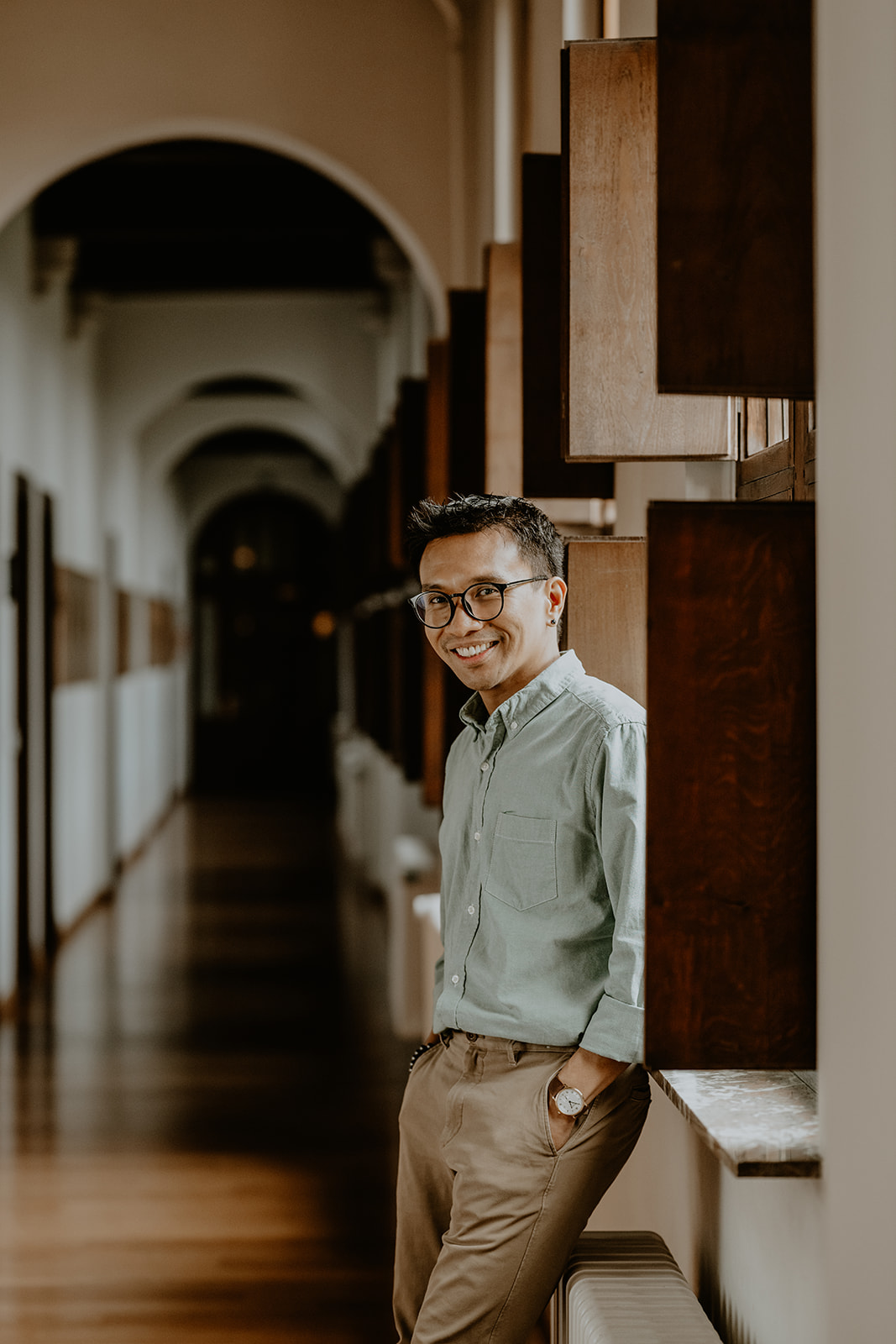
Jayeel Serrano Cornelio is Associate Professor and Director of the Development Studies Program at the Ateneo de Manila University.
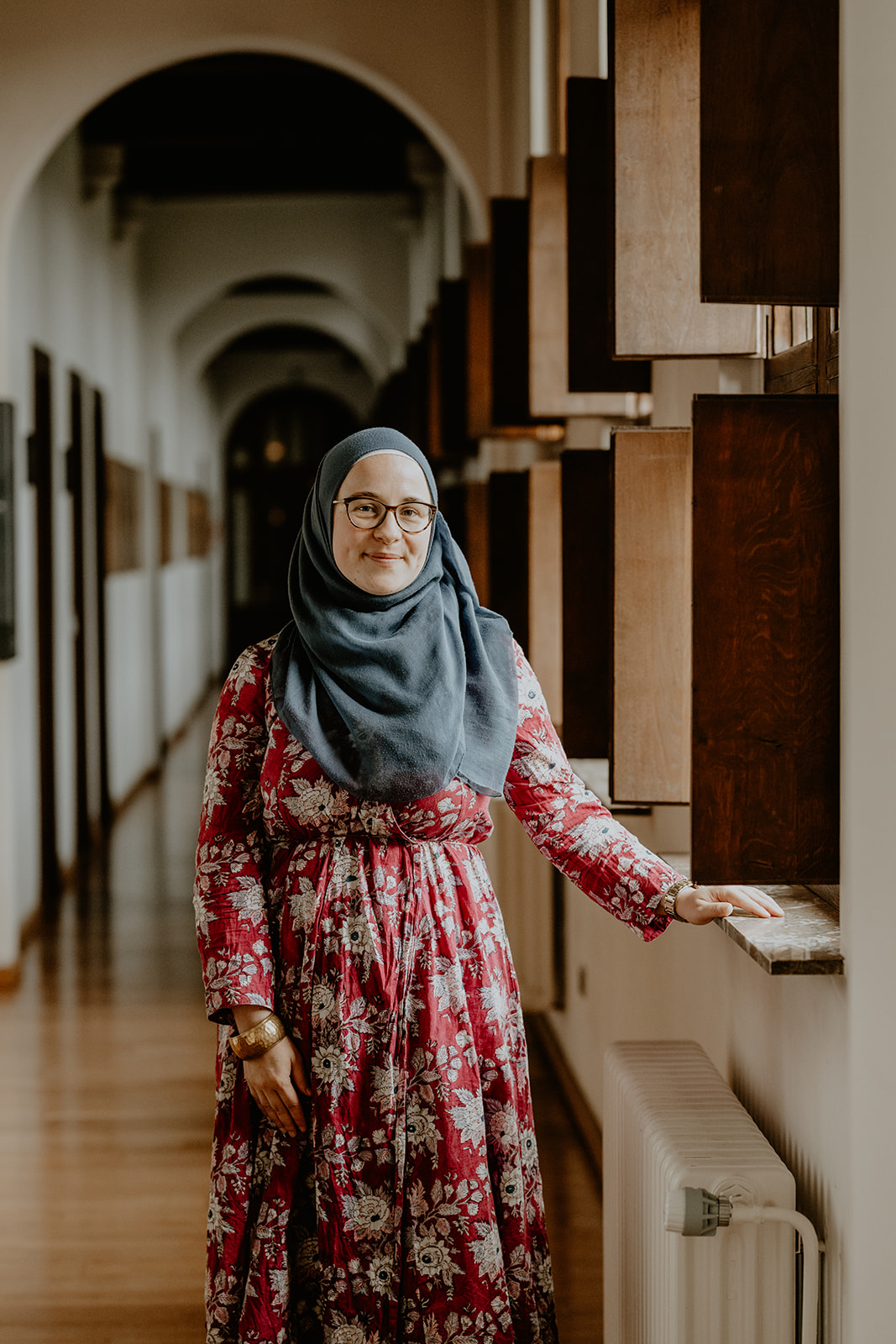
Jennifer Philippa Eggert is a social, political and cultural scientist with a background in research and practice. She is senior Programme and Research Associate at the Joint Learning Initiative on Faith & Local Communities

Vlad Naumescu is Associate Professor at the Department of Sociology and Social Anthropology of the Central European University.
Presented papers
- Re-evangelizing Missions: The American Frontier of the Traditional Catholic Movement by Edward Ablang (Notre Dame University)
- Articulation of Religion in a Cultural Organization by KJ Ananthan (IISER Bhopal)
- Populism as a Call to Take Political Emotions Seriously: An Interdisciplinary and Theological-Ethical Analysis by Valerio Aversano (KU Leuven)
- The Politics of Recognition in US-Philippine-Vatican Relations, 1898-1899 by Jethro Calacday (University of Cambridge)
- The Crisis of Progress. A Theological-Political Interpretation by Xavier Casanovas Combalia (IQS – University Ramon Llull)
- Testing a Psychologically-Nuanced Motivational Model of Religious Prejudice Among Filipino Christians by Darren Dumaop (De La Salle University)
- Religion in the Public Sphere: the Working Principles of Satras in Assam by Namrata Hazarika (Indian Institute of Technology, Delhi)
- ‘Would you like to be an agent of radical love?’: Seventh-Day Adventist Theological Strategies for Civic Engagement in a Divided America by Jen Logan (University College London)
- Religious Intellectuals in Post-Colonial Vietnam: Buddhist Nationalists, Progressive Catholics, and their Advocacy for Peace and National Reconciliation, 1963-1975 by Thao Nghiem (University of Groningen)
- Being Dalit and Christian: Conceptualizing Dalit Christianity and Politicized Dalit Christian Theology in India by Bincy Mariya Nirichan (IISER Bhopal)
- Freeing Religion: The Rise of “Conservative” Transnational Religious Networks at the Organization of American States (OAS) by Ely Orrego Torres (Northwestern University / Sciences Po)
- Reinforcement of Anti-Communism in the South Korean Church (1948-1980): Theological Perspectives of the Conservative Church by Sunkyo Park (University of Manchester)
- From Anti-Communism to Illiberalism: Romanian ‘Spiritual Resistance’ to Communism and the Transnational Rise of Populism (1960s-2020s) by Iona Ramsay (University of Exeter)
- The Synodal Church: a Miracle Solution From a Contemporary Perspective or Not? by Jens Van Rompaey (KU Leuven)

